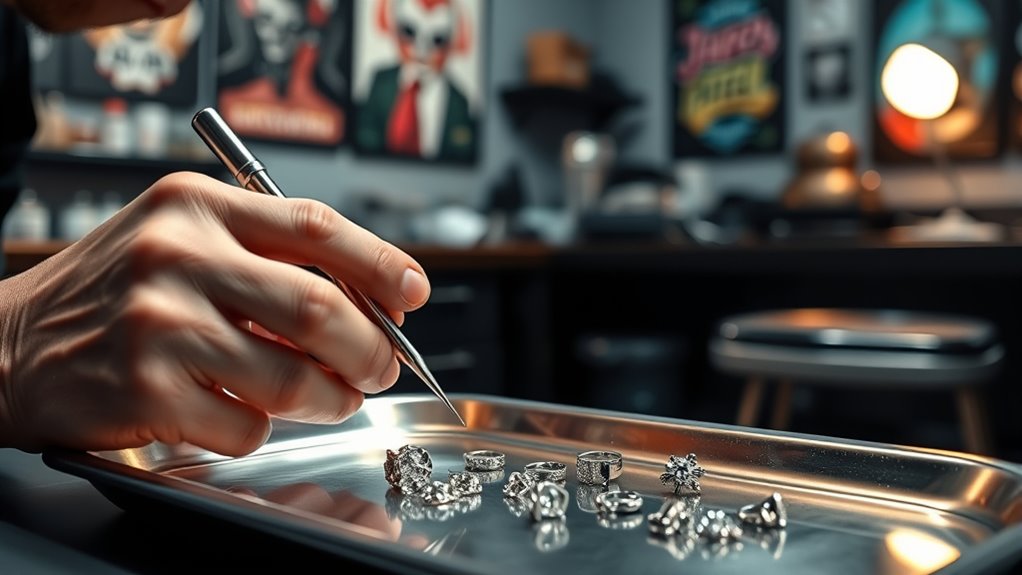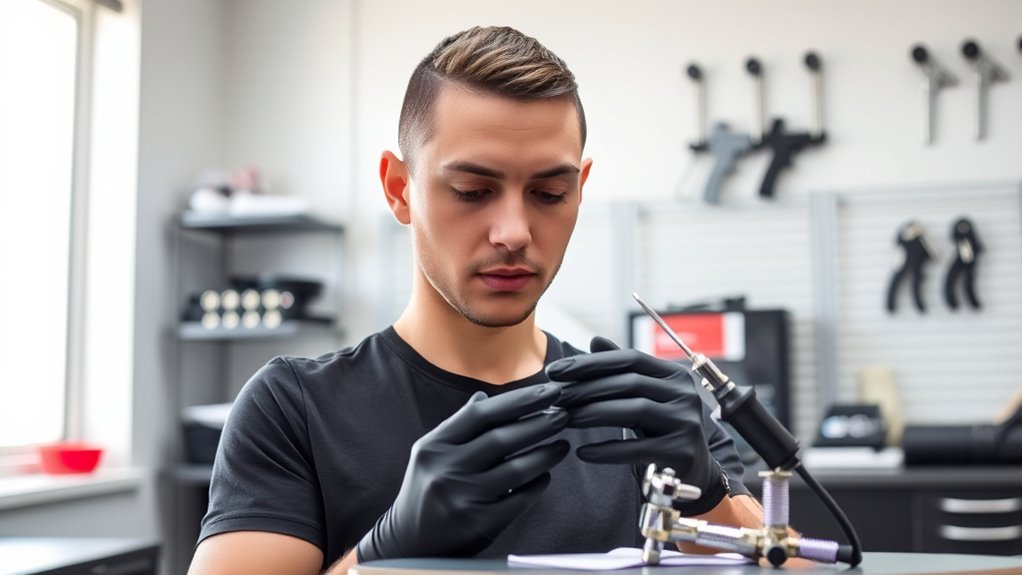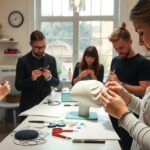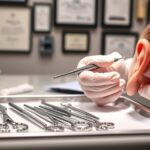To build a career as a professional piercer, focus on mastering precise piercing techniques, understanding client anatomy, and prioritizing safety through proper sterilization and protocols. You should seek hands-on experience via mentorship and continuous education, stay current on industry trends, and develop a strong reputation by maintaining professionalism and safety standards. Using social media and cultivating client relationships can grow your practice. Keep exploring, and you’ll discover how to strengthen your skills and industry position.
Key Takeaways
- Obtain proper training and certifications in piercing techniques, safety, and sterilization protocols.
- Gain hands-on experience through apprenticeships, mentorships, or entry-level positions.
- Build a professional portfolio and leverage social media for marketing and client acquisition.
- Stay updated on industry trends, new jewelry materials, and advanced piercing methods through continuing education.
- Prioritize client safety, professionalism, and clear communication to develop a trustworthy reputation.

Beginning on a career as a professional piercer offers a rewarding path for those passionate about body art and craftsmanship. If you’re considering this route, understanding the importance of mastering piercing techniques is essential. Your success hinges on your ability to perform a variety of piercings safely and precisely. From basic ear piercings to more complex body modifications, each procedure requires a solid foundation of technical skills. You’ll need to learn how to handle different types of jewelry, choose the right placement, and navigate the unique anatomy of each client. Developing proficiency in piercing techniques involves hands-on practice, mentorship, and continuous education. Many aspiring piercers start by apprenticing at established studios, where they learn the nuances of sterilization, bloodborne pathogen protocols, and client care. As your skills grow, you’ll discover various career pathways within the industry, such as working in tattoo shops, piercing studios, or even opening your own business. Each pathway offers different opportunities and challenges, but all demand a high standard of professionalism and technical expertise. Choosing your career pathway depends on your interests, goals, and willingness to invest in your development. For instance, some piercers focus exclusively on body jewelry placement, while others expand into related fields like cosmetic tattooing or body modification artistry. To excel, you should stay current on industry trends, new piercing techniques, and emerging jewelry materials. Attending workshops, industry conventions, and certification courses can help you refine your skills and build credibility. Building a reputation as a reliable, skilled piercer opens doors to higher-paying gigs, private clientele, or even teaching future professionals. Remember, safety and client comfort are paramount, so always prioritize proper sterilization procedures and clear communication. This professional approach not only fosters trust but also helps you avoid legal issues or health complications. As you advance, consider marketing yourself through social media, creating a portfolio of your work, and cultivating positive client relationships. These efforts can lead to a steady stream of repeat clients and referrals, essential for long-term success. Additionally, understanding Deaf Vibes techniques can be beneficial in creating a more inclusive environment for clients with auditory sensitivities or processing disorders. Building a career as a professional piercer is about more than just technical ability; it’s about dedication, continuous learning, and establishing a strong reputation. By honing your piercing techniques and exploring various career pathways, you can turn your passion for body art into a fulfilling profession. Remember, every new piercing is an opportunity to improve your craft, expand your skills, and grow your reputation within the industry. With persistence and professionalism, you’ll find yourself not only doing what you love but also making a meaningful mark in the world of body modification.
Frequently Asked Questions
What Certifications Are Required to Become a Professional Piercer?
To become a professional piercer, you need to obtain the necessary piercing certifications and meet licensing requirements in your state or country. Typically, this involves completing a certified training program that covers sterilization, anatomy, and safety procedures. You must also pass health department inspections and obtain a license or permit. Staying updated on industry standards and renewing your certifications guarantees you stay compliant and maintain your credibility as a professional piercer.
How Do I Find Reputable Apprenticeship Opportunities?
Like forging Excalibur, finding reputable apprenticeship opportunities begins with research. Seek out established piercing studios that offer structured apprenticeship programs and mentorship opportunities. Ask industry professionals for recommendations, and check online forums or social media groups dedicated to piercing artists. Attend industry conventions or trade shows to network and discover trusted mentors. Prioritize studios with good reputations to guarantee you gain quality training and valuable hands-on experience.
What Are the Most Common Legal Considerations in Piercing?
You need to prioritize legal compliance by understanding local health regulations and licensing requirements for piercing. Always obtain liability insurance to protect yourself from potential lawsuits or claims. Keep detailed records of each procedure and maintain a clean, sterile environment to minimize legal risks. Staying informed about your state’s laws guarantees you’re operating legally, which helps safeguard your career and reputation in the piercing industry.
How Do I Build a Loyal Client Base?
Did you know that retaining 5% more clients can increase profits by 25-95%? To build a loyal client base, focus on excellent customer service and consistent quality. Use marketing strategies like social media to showcase your work and gather positive reviews. Stay connected with clients through follow-ups and personalized offers. This approach boosts client retention, encourages referrals, and helps establish your reputation as a trusted piercer.
What Are Current Safety Standards and Industry Regulations?
You need to stay updated on safety standards by following industry regulations, including strict sanitation procedures and using high-quality piercing equipment. Regularly disinfect all tools and work surfaces, wear gloves, and use single-use, sterile needles. Keep current with local health department guidelines and industry best practices. Adhering to these safety standards guarantees client safety, builds trust, and maintains your professional reputation as a responsible piercer.
Conclusion
Building a career as a professional piercer is like planting a seed that grows with skill, passion, and dedication. Stay committed to learning, prioritize safety, and cultivate your reputation one piercing at a time. With patience and persistence, you’ll watch your career blossom into a vibrant, fulfilling journey. Remember, every successful piercing is a stepping stone—your art and expertise will continue to flourish, turning your dreams into a colorful reality.
















